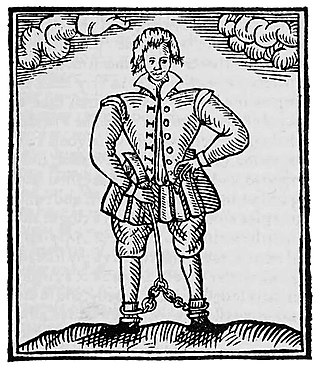Related Research Articles

The Raigne of King Edward the Third, often shortened to Edward III, is an Elizabethan play printed anonymously in 1596, and at least partly written by William Shakespeare. It began to be included in publications of the complete works of Shakespeare only in the late 1990s. Scholars who have supported this attribution include Jonathan Bate, Edward Capell, Eliot Slater, Eric Sams, Giorgio Melchiori and Brian Vickers. The play's co-author remains the subject of debate: suggestions have included Thomas Kyd, Christopher Marlowe, Michael Drayton, Thomas Nashe and George Peele.
This article presents lists of literary events and publications in the 16th century.
This article presents lists of the literary events and publications in 1633.
This article contains information about the literary events and publications of 1608.
This article contains information about the literary events and publications of 1602.
This article presents lists of the literary events and publications in 1600.
This article lists notable literary events and publications in 1599.
This article contains information about the literary events and publications of 1597.
This article presents lists of the literary events and publications in 1593.
This article contains information about the literary events and publications of 1592.

Thomas Nashe was an Elizabethan playwright, poet, satirist and a significant pamphleteer. He is known for his novel The Unfortunate Traveller, his pamphlets including Pierce Penniless, and his numerous defences of the Church of England.
Philip Henslowe was an Elizabethan theatrical entrepreneur and impresario. Henslowe's modern reputation rests on the survival of his diary, a primary source for information about the theatrical world of Renaissance London.
The Rose was an Elizabethan playhouse, built by theatre entrepreneur Philip Henslowe in 1587. It was the fifth public playhouse to be built in London, after the Red Lion in Whitechapel (1567), The Theatre (1576) and the Curtain (1577), both in Shoreditch, and the theatre at Newington Butts – and the first of several playhouses to be situated in Bankside, Southwark, in a liberty outside the jurisdiction of the City of London's civic authorities. Two of the earliest plays by William Shakespeare – Titus Andronicus and Henry VI, Part 1 – are recorded as having been performed there, as well as plays by dramatists such as Christopher Marlowe, Thomas Kyd, Robert Greene, George Peele, Thomas Dekker, Michael Drayton, Ben Jonson and Thomas Heywood. The Rose's archaeological remains were rediscovered in 1989 during the redevelopment of the site to build an office block, and were partially excavated. After a public campaign to preserve the remains, they are now listed by Historic England as a Scheduled Monument at Risk. Subsequently the site has become an exhibition space and theatre venue, known as The Rose Playhouse, administered by The Rose Theatre Trust, a registered charity, which plans to first complete the excavation and preservation of the remains, and then to build a new visitor, education and arts centre there.
George Peele was an English translator, poet, and dramatist, who is most noted for his supposed, but not universally accepted, collaboration with William Shakespeare on the play Titus Andronicus. Many anonymous Elizabethan plays have been attributed to him, but his reputation rests mainly on Edward I, The Old Wives' Tale, The Battle of Alcazar, The Arraignment of Paris, and David and Bethsabe. The Troublesome Reign of John, King of England, the immediate source for Shakespeare's King John, has been published under his name.

Ferdinando Stanley, 5th Earl of Derby, was an English nobleman and politician. He was the son of Henry Stanley, 4th Earl of Derby, and Lady Margaret Clifford. Ferdinando had a place in the line of succession to Elizabeth I according to the will of Henry VIII, after his mother, whom he predeceased. His sudden death led to suspicions of poisoning amid fears of Catholic plots to overthrow Elizabeth.
Mathew Roydon was an English poet associated with the School of Night group of poets and writers.
The Earl of Sussex's Men was a playing company or troupe of actors in Elizabethan and Jacobean England, most notable for their connection with the early career of William Shakespeare.
Events from the 1590s in England.

Greenes, Groats-worth of Witte, bought with a million of Repentance (1592) is a tract published as the work of the Elizabethan author Robert Greene.
Sir Edward Wingfield of Kimbolton (c.1562-1603), member of Parliament and author of a masque.
References
- ↑ Orgel, Stephen (1965). The Jonsonian Masque . Cambridge, Massachusetts: Harvard University Press. p. 9.
- ↑ Christopher Marlowe; R. H. Case (1966). The Works and Life of Christopher Marlowe. Gordian Press. p. 55.